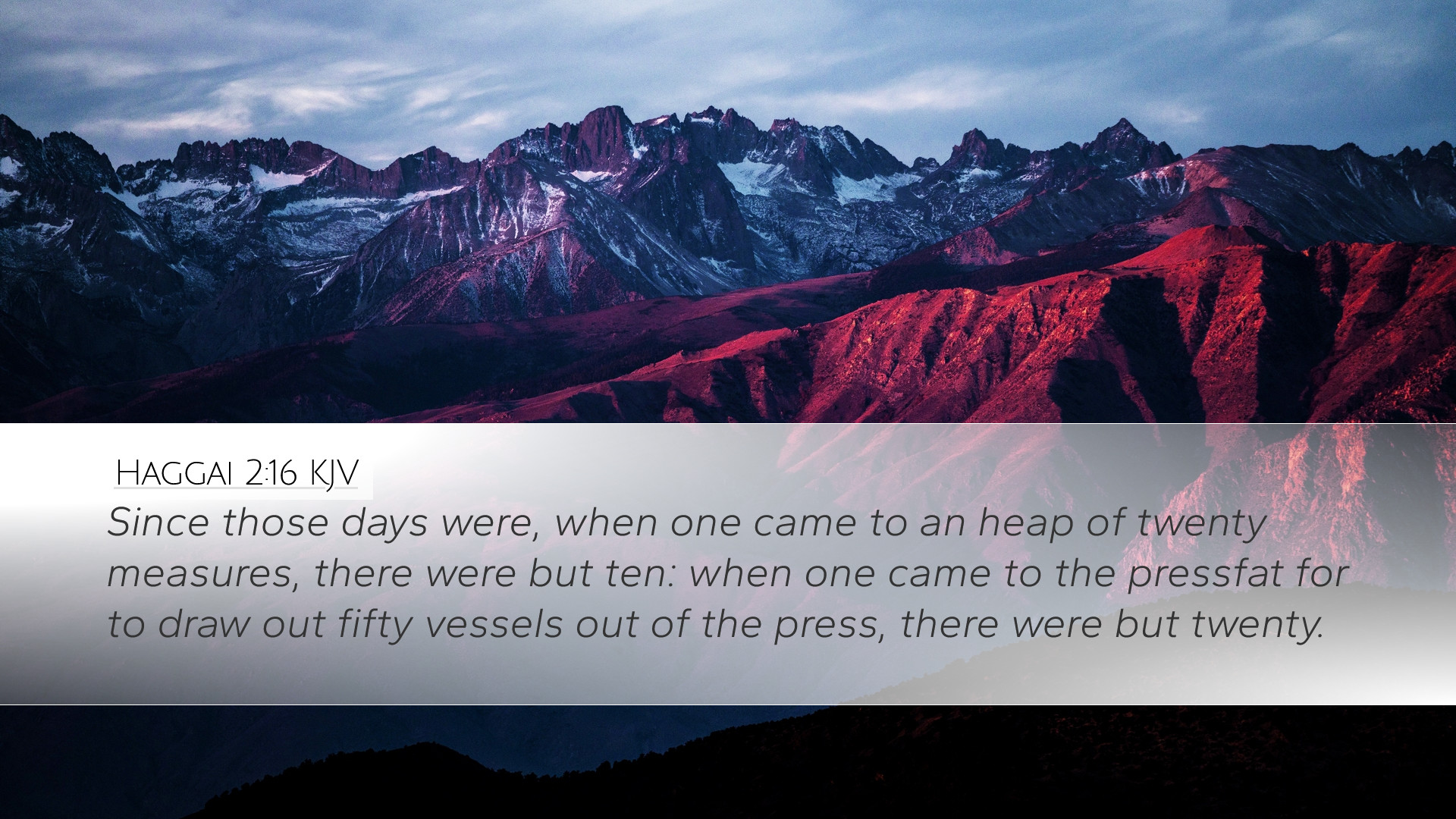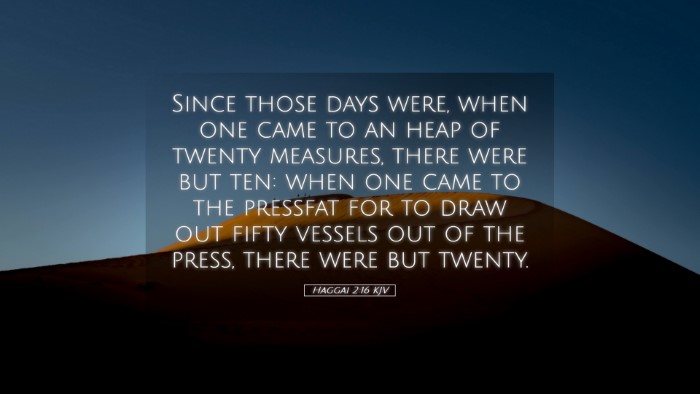Old Testament
Genesis Exodus Leviticus Numbers Deuteronomy Joshua Judges Ruth 1 Samuel 2 Samuel 1 Kings 2 Kings 1 Chronicles 2 Chronicles Ezra Nehemiah Esther Job Psalms Proverbs Ecclesiastes Song of Solomon Isaiah Jeremiah Lamentations Ezekiel Daniel Hosea Joel Amos Obadiah Jonah Micah Nahum Habakkuk Zephaniah Haggai Zechariah MalachiHaggai 2:16
Haggai 2:16 KJV
Since those days were, when one came to an heap of twenty measures, there were but ten: when one came to the pressfat for to draw out fifty vessels out of the press, there were but twenty.
Haggai 2:16 Bible Commentary
Commentary on Haggai 2:16
Haggai 2:16 states, "Since those days, when one came to a heap of twenty measures, there were but ten; when one came to the winevat to draw out fifty vessels out of the press, there were but twenty."
Introduction
This verse reflects the economic decline and the spiritual disarray that afflicted the people of God during the post-exilic period. It highlights the challenges they faced as they returned to rebuild both their lives and the temple. The insights from various public domain commentaries help elucidate the significance of this passage and can provide valuable lessons for contemporary readers.
Contextual Background
The Book of Haggai is a prophetic message aimed at the people of Judah who had returned from Babylonian exile. With the temple in ruins and agricultural productivity diminished, Haggai's messages serve as a call to action, encouraging the people to prioritize the rebuilding of God’s house. This particular verse encapsulates the consequences of their neglect and serves to remind them of God’s providence and the ramifications of their recent disobedience.
Exegesis and Commentary
Matthew Henry suggests that the figures presented in Haggai 2:16 are indicators of divine judgment upon the people. The reduction of expected yields—from twenty measures to ten and from fifty vessels to twenty—symbolizes the spiritual drought resulting from their failure to rebuild the temple. Henry emphasizes that this serves as a stern reminder of God’s sovereignty and the importance of obedience:
- Divine Judgment: The diminished harvests reflect the chastisement for their misplaced priorities.
- Spiritual Significance: This judgment serves to awaken the community to their need for restoration and renewed faithfulness.
Albert Barnes furthers this discussion by highlighting the tangible effects of Israel's disobedience. He notes that the people's failure to prioritize God resulted in economic hardship:
- Evident Results: The specific measures point to a historical reality—what used to be sufficient became inadequate due to divine withdrawal of blessing.
- Covenantal Relationship: Barnes argues that Israel's prosperity is linked to their fidelity to God’s commandments; their economic struggles reflect their breach of this relationship.
Adam Clarke adds depth by emphasizing the societal implications of the failed harvests. He cites how food scarcity leads to social unrest and a fracturing of community bonds:
- Community Impact: The lack of abundance serves to show that individual disobedience has communal repercussions.
- Call to Reflection: Clarke encourages contemporary believers to reflect on their own lives and priorities in light of their spiritual engagement with God.
Theological Implications
This verse encourages a theological reflection on God’s involvement in the lives of His people. It acts as a stark reminder of how spiritual and material realities are interwoven—a theme echoed throughout Scripture:
- Material vs. Spiritual Reality: The material lack serves as a metaphor for spiritual emptiness, indicating the necessity of aligning one’s priorities with God’s will.
- Restoration through Obedience: The call to rebuild the temple stands as a proclamation that returning to God leads to restoration not just spiritually but also materially.
Application for Today
For pastors, students, theologians, and scholars, this passage bears significant lessons:
- Prioritizing God’s Work: The importance of placing God’s kingdom first cannot be overstated. Just as the Israelites learned, so must we recognize the blessing that comes from obedience.
- Awareness of Consequences: Understanding the nuances of divine judgment and grace, as elucidated by Henry, Barnes, and Clarke, fosters a healthy fear of the Lord, leading to deeper commitment.
- Community Responsibility: The collective nature of obedience and blessing serves to remind us that personal faith has implications for the broader community of believers.
Conclusion
Haggai 2:16 speaks to the heart of God’s relationship with His people. The echoed sentiments from revered commentators like Matthew Henry, Albert Barnes, and Adam Clarke serve to reinforce the transformative call of God upon His people—both historically and in contemporary settings. As we reflect on this passage, may it challenge us to examine our own priorities, urging us not only to seek individual renewal but also to foster a deeper commitment to communal faithfulness.


